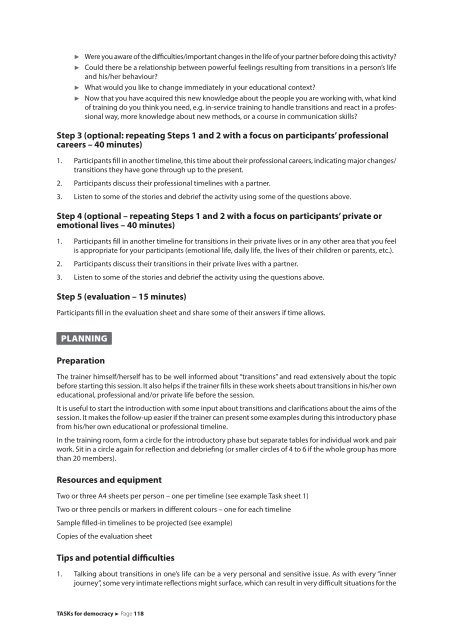TASKs for democracy
4NYw4W
4NYw4W
Create successful ePaper yourself
Turn your PDF publications into a flip-book with our unique Google optimized e-Paper software.
Were you aware of the difficulties/important changes in the life of your partner be<strong>for</strong>e doing this activity?<br />
Could there be a relationship between powerful feelings resulting from transitions in a person’s life<br />
and his/her behaviour?<br />
What would you like to change immediately in your educational context?<br />
Now that you have acquired this new knowledge about the people you are working with, what kind<br />
of training do you think you need, e.g. in-service training to handle transitions and react in a professional<br />
way, more knowledge about new methods, or a course in communication skills?<br />
Step 3 (optional: repeating Steps 1 and 2 with a focus on participants’ professional<br />
careers – 40 minutes)<br />
1. Participants fill in another timeline, this time about their professional careers, indicating major changes/<br />
transitions they have gone through up to the present.<br />
2. Participants discuss their professional timelines with a partner.<br />
3. Listen to some of the stories and debrief the activity using some of the questions above.<br />
Step 4 (optional – repeating Steps 1 and 2 with a focus on participants’ private or<br />
emotional lives – 40 minutes)<br />
1. Participants fill in another timeline <strong>for</strong> transitions in their private lives or in any other area that you feel<br />
is appropriate <strong>for</strong> your participants (emotional life, daily life, the lives of their children or parents, etc.).<br />
2. Participants discuss their transitions in their private lives with a partner.<br />
3. Listen to some of the stories and debrief the activity using the questions above.<br />
Step 5 (evaluation – 15 minutes)<br />
Participants fill in the evaluation sheet and share some of their answers if time allows.<br />
PLANNING<br />
Preparation<br />
The trainer himself/herself has to be well in<strong>for</strong>med about “transitions” and read extensively about the topic<br />
be<strong>for</strong>e starting this session. It also helps if the trainer fills in these work sheets about transitions in his/her own<br />
educational, professional and/or private life be<strong>for</strong>e the session.<br />
It is useful to start the introduction with some input about transitions and clarifications about the aims of the<br />
session. It makes the follow-up easier if the trainer can present some examples during this introductory phase<br />
from his/her own educational or professional timeline.<br />
In the training room, <strong>for</strong>m a circle <strong>for</strong> the introductory phase but separate tables <strong>for</strong> individual work and pair<br />
work. Sit in a circle again <strong>for</strong> reflection and debriefing (or smaller circles of 4 to 6 if the whole group has more<br />
than 20 members).<br />
Resources and equipment<br />
Two or three A4 sheets per person – one per timeline (see example Task sheet 1)<br />
Two or three pencils or markers in different colours – one <strong>for</strong> each timeline<br />
Sample filled-in timelines to be projected (see example)<br />
Copies of the evaluation sheet<br />
Tips and potential difficulties<br />
1. Talking about transitions in one’s life can be a very personal and sensitive issue. As with every “inner<br />
journey”, some very intimate reflections might surface, which can result in very difficult situations <strong>for</strong> the<br />
<strong>TASKs</strong> <strong>for</strong> <strong>democracy</strong> Page 118


